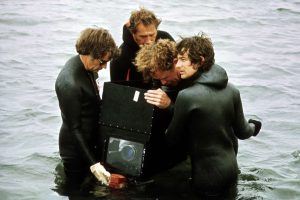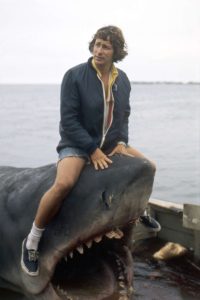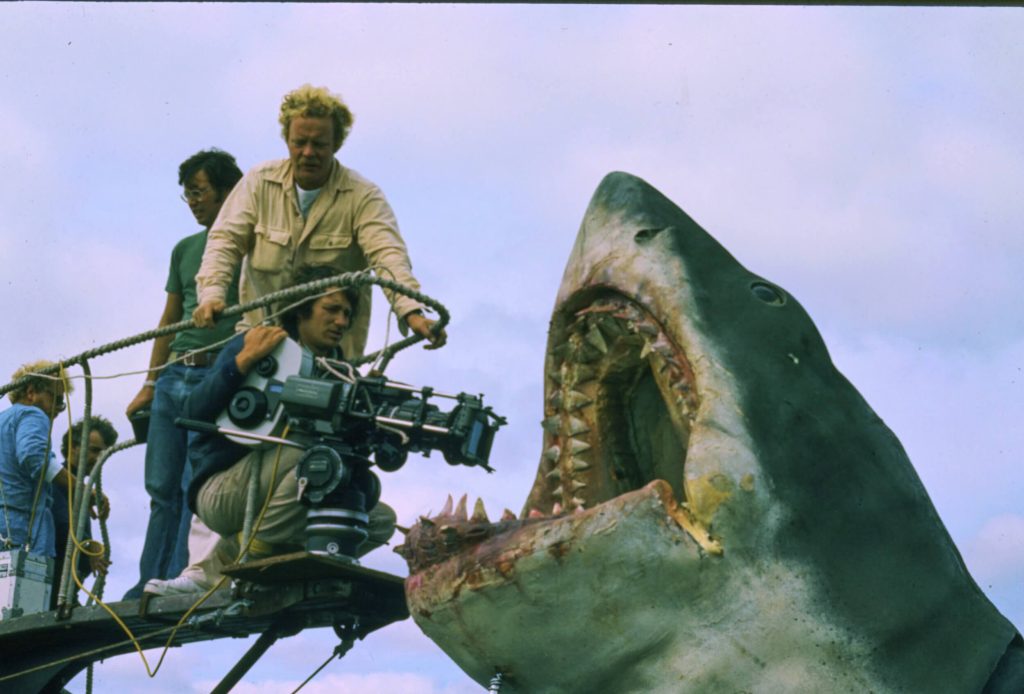World News
Steven Spielberg’s Near-Heart Attack During Jaws Production: Overcoming Adversity to Create a Masterpiece
Jaws (1975), directed by Steven Spielberg, is widely regarded as one of the greatest films in cinematic history. It not only launched Spielberg’s career into the stratosphere but also changed the landscape of Hollywood filmmaking, establishing the summer blockbuster as a dominant force in the industry. However, the path to success was anything but smooth. From technical issues with the animatronic shark to weather-related delays, Jaws was a production plagued with difficulties. One of the most surprising revelations, however, is that Spielberg himself believed he was suffering from a heart attack during filming. These challenges, along with Spielberg’s intense commitment to the film, shaped both the movie and his career in ways that continue to be felt today.
In this article, we will explore Spielberg’s experience during the making of Jaws, including the physical toll the production took on him, how he pushed through these hardships, and how the resulting film became the groundbreaking masterpiece we know today. Through exploring his mental and physical challenges, we will also examine how Spielberg’s resilience shaped his filmmaking style and influence on the industry.
The Pressure of Making a Blockbuster
When Steven Spielberg was brought on to direct Jaws, he was relatively unknown. Despite directing a few television movies and feature films, he wasn’t yet considered a major name in Hollywood. Yet, Jaws was destined to be a high-stakes project. Based on Peter Benchley’s bestselling novel, the story of a killer shark terrorizing a beach town offered the potential for a thrilling, edge-of-your-seat experience. The production budget, however, was not without its complications. The film was shot on location in Martha’s Vineyard, and Spielberg, having limited experience with large-scale productions, quickly found himself up against numerous challenges.
As soon as production began, Spielberg was under enormous pressure. The film’s scope, combined with the technical complexities of shooting with an animatronic shark, caused frequent delays. The shark, affectionately known as “Bruce” by the cast and crew, was prone to malfunctioning, and Spielberg’s plans for many of the film’s pivotal scenes had to be altered. This left Spielberg feeling more stressed than ever before, as he was forced to adapt on the fly while still keeping the film on schedule.
In the early stages, Spielberg was plagued by self-doubt. The technical difficulties, compounded by the ever-growing pressure from the studio and the looming deadline, made him question his ability to deliver a successful movie. The film’s production dragged on for over 150 days—much longer than anticipated—and Spielberg’s exhaustion began to show.
During these grueling months, Spielberg’s health took a hit. The long days and sleepless nights, combined with the mental stress, eventually caused him to experience what he believed was a heart attack. He later revealed in interviews that, while filming, he was unsure whether he was truly suffering from a heart attack or simply dealing with the immense stress of the project. Whatever the cause, Spielberg was physically and mentally drained, and his health became a significant concern during the production of the film.

Facing a Near-Heart Attack: Spielberg’s Personal Struggle
In the midst of the chaotic production, Spielberg faced a moment of physical collapse that would leave a lasting mark on his life. While working on the film, Spielberg began to experience extreme chest pains and shortness of breath. At first, he attributed the symptoms to the immense stress of the production, but the severity of the pain caused him to seek medical attention. He feared the worst—he thought he was suffering from a heart attack.
The stress of managing the film, coupled with the constant technical challenges, was taking a serious toll on Spielberg’s body. Even in the face of his apparent health crisis, Spielberg pushed forward with the production, refusing to let the setback halt the momentum of the film. He had to make difficult decisions on set, balancing his health with the demands of the studio, the cast, and the crew. It was a defining moment for Spielberg—a moment when his physical exhaustion mirrored the emotional exhaustion of the characters in the film itself.
After being seen by doctors, Spielberg was told that the chest pains were not a result of a heart attack but rather a severe case of anxiety. It was a wake-up call for the director, who had been putting his body through an extraordinary amount of stress in the name of completing the movie. Though Spielberg’s health was not at risk in the way he had feared, the incident nonetheless underscored the immense pressure he was under during the making of Jaws. It highlighted the often-overlooked emotional and physical toll that filmmaking can take on directors, especially when the stakes are so high.
The Unseen Battles: Spielberg’s Leadership Under Pressure
While Spielberg’s personal struggle was one aspect of the Jaws production, the director’s leadership in the face of adversity also played a crucial role in the film’s success. Despite the setbacks and challenges, Spielberg’s determination and creativity flourished during the making of Jaws. One of the key reasons the film became such a monumental success was Spielberg’s ability to adapt to unforeseen circumstances. When the mechanical shark malfunctioned, Spielberg made a creative decision that would forever change the way the film was made: he chose to keep the shark off-screen for much of the movie. Instead of relying on the shark as the central visual element, he increased the film’s tension by focusing on the fear of the unknown.
This decision, born out of necessity, ended up being one of the most effective elements of the film. By limiting the shark’s appearances, Spielberg heightened the suspense and allowed the audience’s imagination to fill in the blanks. This became one of the film’s most memorable qualities—its ability to create tension through suggestion rather than spectacle. Spielberg’s ability to pivot under pressure, to turn an obstacle into an advantage, speaks volumes about his resourcefulness as a filmmaker.
The pressure wasn’t just confined to technical issues; Spielberg had to navigate the relationships between the actors as well. Roy Scheider, who played Chief Brody, was known to have clashed with the director during filming. Despite the tension, Spielberg managed to maintain his focus and create a work environment that allowed the film to thrive. The director’s leadership during these difficult times would ultimately help build a stronger sense of camaraderie on set, making the final product feel more cohesive and focused.

The Impact of Jaws on Spielberg’s Career
After the challenges of making Jaws, Steven Spielberg’s life and career would never be the same. Upon its release, Jaws became a massive success, both critically and commercially, and established Spielberg as a major force in Hollywood. The film’s unprecedented box office numbers marked the beginning of a new era in filmmaking, and Spielberg’s reputation as a director was solidified.
However, Jaws was not just a career-making moment for Spielberg—it was a transformative experience in his life. The toll the production took on him personally and physically made Spielberg a more resilient and focused filmmaker. In later years, Spielberg would go on to create some of the most iconic films in history, from E.T. the Extra-Terrestrial (1982) to Schindler’s List (1993), Jurassic Park (1993), and Saving Private Ryan (1998). With each new project, Spielberg continued to push the boundaries of filmmaking, constantly refining his craft while maintaining a focus on strong storytelling and character-driven narratives.
The lessons Spielberg learned during Jaws would become integral to his approach to filmmaking. He became known for his ability to remain calm under pressure, for his ingenuity in the face of obstacles, and for his ability to bring out the best in his actors and crew. The production of Jaws, despite the challenges, set the stage for Spielberg’s long and successful career in the film industry.
Jaws 50th Anniversary Signature Thank You For The Memories 3D T-Shirt
A Legacy Defined by Resilience and Vision
Looking back on the making of Jaws, it’s clear that the production was not just a triumph of cinema—it was a testament to Steven Spielberg’s resilience and vision. The emotional and physical strain he endured during filming only added to the film’s mythos, turning Jaws into more than just a shark movie. It became a story about overcoming adversity, both on-screen and off-screen, and about how perseverance and creativity can lead to extraordinary results.
The challenges Spielberg faced during the making of Jaws have become part of the film’s legendary status. The director’s ability to push through physical and emotional turmoil, coupled with his remarkable creativity in the face of constant obstacles, allowed him to create a film that would go on to influence an entire generation of filmmakers. The film’s success also marked the beginning of the modern blockbuster era, where audience expectations for spectacle and thrills would forever be changed.
Steven Spielberg’s experience on Jaws not only changed the trajectory of his career but also transformed the landscape of Hollywood filmmaking. The resilience and creativity he demonstrated during this challenging time paved the way for the visionary filmmaker he would become. Today, Jaws remains one of the greatest films ever made, and its legacy continues to inspire directors and film lovers worldwide.
Jaws 50 Years 1975-2025 Signature Thank You For The Memories Hawaiian Shirt
Conclusion: The Making of a Masterpiece Through Adversity
The production of Jaws is a story of overcoming adversity—both physical and creative. Spielberg’s belief that he had suffered a heart attack during filming is just one aspect of the many challenges he faced while making this iconic film. Yet, through it all, Spielberg remained determined to deliver a film that would go down in history as one of the greatest cinematic achievements. The pressure, the exhaustion, and the setbacks only made the end result all the more rewarding. Through Jaws, Spielberg proved that even in the face of overwhelming obstacles, creativity, resilience, and vision can lead to the creation of something truly extraordinary.
From diamondteedesign


